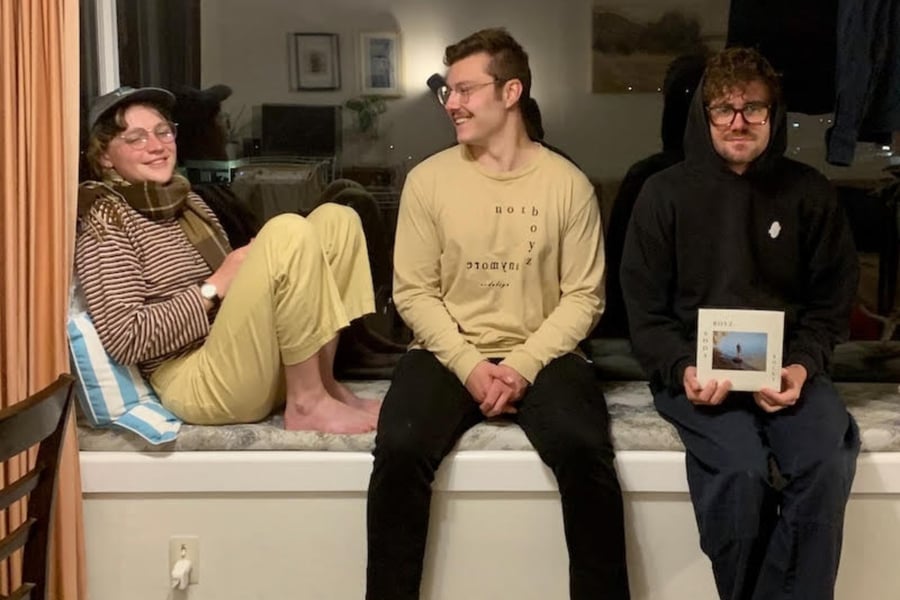SODA BOYZ are shedding their “BOYZ” label. 2025 is all about growth, with their second album, Not Boyz Anymore, out now and an Australian tour already in their rearview.
The indie slowcore trio – Fi Carr, Josh Finegan, and Jules Rosenbrook – describe the album as a reflection of Aotearoa’s landscapes and the band’s personal journey through “aging, trauma, memories, loss, and coming to terms with transitioning.”
This three-year project was recorded with the expertise of renowned New Zealand engineer James Goldsmith and mastered by Carl Saf. Recalling contemporaries like Joyer and Horse Jumper of Love, or, further back, the iconic Duster, is exactly how great slowcore should sound: hauntingly meditative and methodical, subdued but with flickers of transcendence.
Formed in Te Papaioea, SODA BOYZ released their debut album, Farewell Spit, in mid-2020. Rolling Stone AU/NZ caught up with the band as part of our Up-And-Coming Aotearoa Artists series. Read their full interview below.
SODA BOYZ’ Not Boyz Anymore is out now.
Rolling Stone AU/NZ: How did music influence you in your early life?
Love Music?
Get your daily dose of everything happening in Australian/New Zealand music and globally.
SODA BOYZ: Growing up in the Manawatū, we were lucky enough to have a strong DIY and all ages music scene, particularly with venues like The Stomach, Great Job!, and Snails.
Josh Finegan: I played my first gig at The Stomach at about age 11, with Fi and Jules pretty soon after. So music has always been very integral to our lives. The DIY music scene in Aotearoa is the core part of our social fabric, including how the three of us met.
What artists influenced you growing up?
Because we were so involved in the local scene, local artists (and other DIY bands touring through) were always our biggest idols when we were coming up. This includes Kiwi bands like So So Modern, Carb on Carb, Die! Die! Die!, and Caroles. Being able to play with these bands was such an honour. It was similar for bands who were touring through Aotearoa, like Ted Danson With Wolves.
When did you discover your passion for creating music?
Jules Rosenbrook: I think it grew slowly. It started with making noise as a teenager. At some point after that instead of channeling angst, I wanted to create an environment or space through music, and that’s when I really felt the passion.
What are some career highlights so far?
Doing our first tour in Australia back in 2018 was a very formative moment for us. Various tours with our friends around Aotearoa have also been important for us.
Another one was giving our hand drawn and dubbed cassette to Steve Albini at a Shellac show in Wellington in the mid-2010s when they were touring. They said they’d listen to it in their tour van. Someone also called Fi a girl and then Mr Albini kicked them out of the show (we now disagree with his stance). We miss him.
Tell us about your new album, Not Boyz Anymore. What themes did you explore on the record?
Part of the record was written when Fi was coming to terms with being trans and how that affected relationships and emotional challenges. We also lost a couple of friends and that caused some difficult maturation, learning to communicate and emotional responsibility. So the album exerts a lot in growth, healing, coming to terms with life and ourselves living in different places and mindsets
View this post on Instagram
What kind of personality traits and values do you believe it takes to succeed in the music industry?
We’ve been given so many opportunities just because we’ve made friends with the right people and surrounded ourselves with the people we get on with. I think it’s important to reach out, be friendly and help others because it’ll likely come back around.
How would you describe your music to a potential fan?
Our sound has definitely evolved over the past few years, we used to get a lot of comparisons to bands like Duster and Slint, and there’s maybe still some of that energy in the new record. We’re starting to explore other aesthetics with Not Boyz Anymore, such as sampling, acoustic instruments and synthesizers (shout out Skymning). We also had a range of other vocalists join us on the record, including people like Carla from Recitals, Shannen and Miles from Welcomer, and Sia Ahmad who we met on our first Australian tour.
What are your goals for 2025 and beyond? What can fans expect from you this year?
Getting the record out and doing this Australia will tick off this year’s goals pretty nicely. For better or worse, we don’t tend to push ourselves too hard as a band and it often takes a long time for things to happen, but this is nice in a way as it leaves us a bit more open to opportunities as they come up.



































